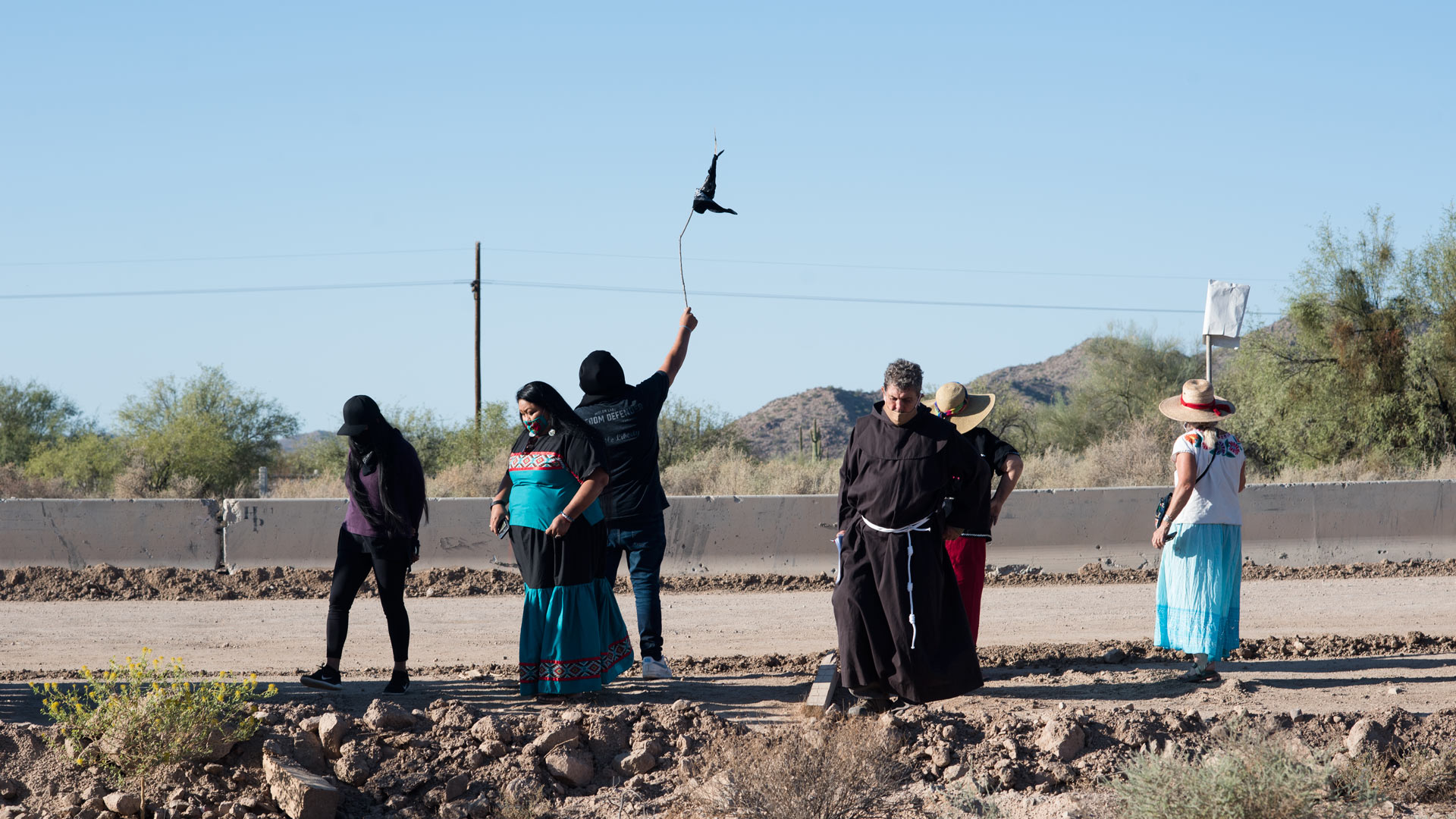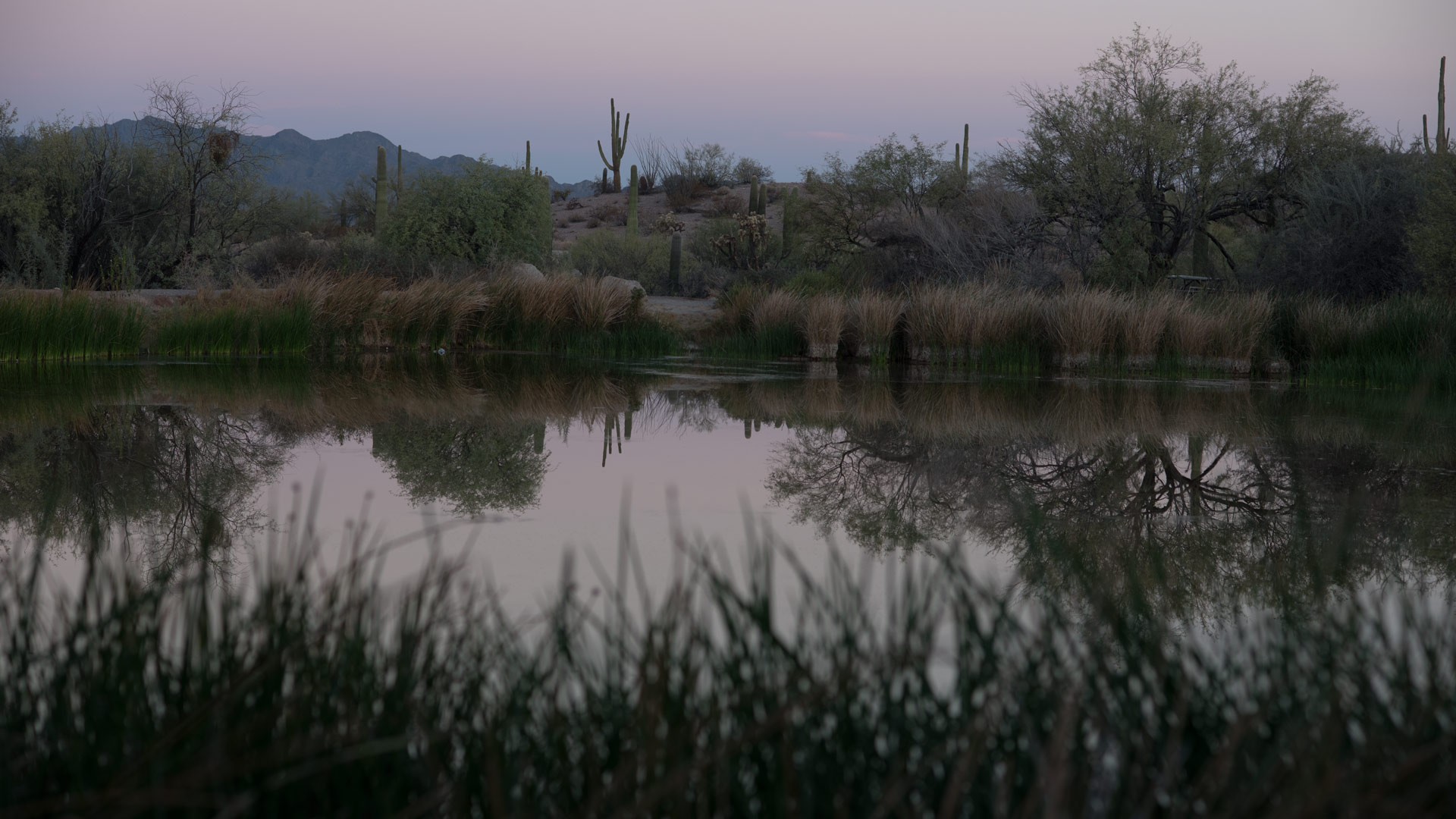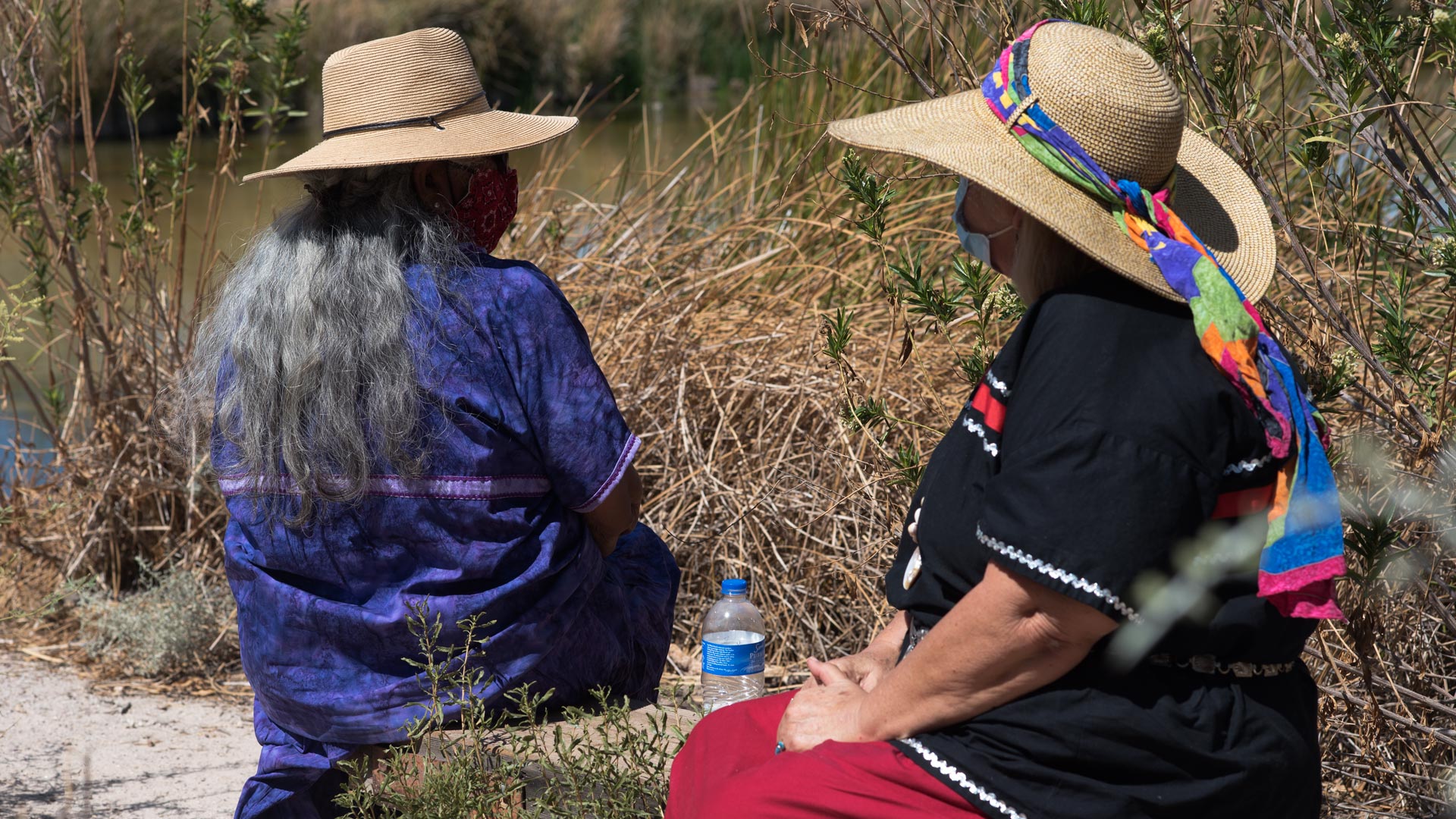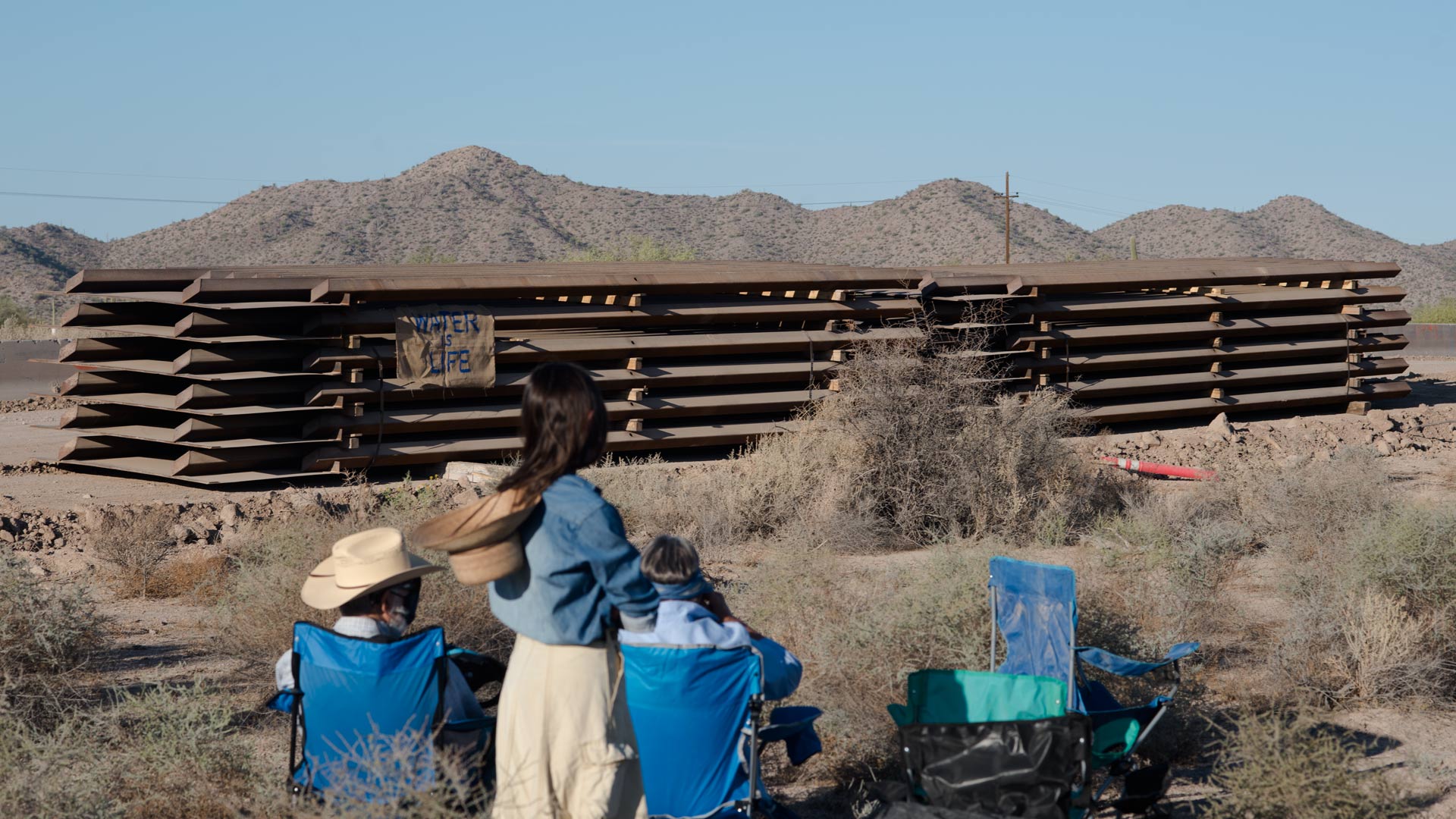 Tribal members and supporters gather in front of the construction line to wave down O'odham runners coming from Sonora ahead of a cross-border ceremony at Quitobaquito Springs on Sept. 27, 2020.
Tribal members and supporters gather in front of the construction line to wave down O'odham runners coming from Sonora ahead of a cross-border ceremony at Quitobaquito Springs on Sept. 27, 2020.
National Park Service officials at Organ Pipe Cactus National Monument announced a road closure that will block access to Quitobaquito Springs.
The closure comes a day after about 30 people from almost a dozen tribes across the West gathered at the ancient water source for a cross-border ceremony held by O'odham leaders.
Before being purchased by the park service in the 1950s, Quitobaquito and the man-made pond it drains into was was home to Eleanor Ortega's relatives and other Hia-Ced O'odham families — a tribe not federally recognized.
"It really breaks my heart when I come over here," Ortega said as she waited for the ceremony to start. "And I feel like my great great grandfather’s probably saying, 'how did you guys allow this to happen? This is your home.'"
This summer, cracked mud flats covered most of the pond’s surface. USGS registered a record low spring flow of 5.5 gallons per minute in mid-July. Indigenous groups and ecologists argue trenching and water pumping for the border wall is exacerbating the drain. Ortega said the spring is the last of what used to be six water sources running through Hia-Ced O'odham land.
"In my lifetime I don't think I'll see this pond be the way it was before, not in my lifetime, there's too much damage here," she said. "I'm hoping the generation coming up can keep this up."
She said the site used to have orchards and farms and was a busy thoroughfare. As construction crews advance on the site, Ortega said she feels like that history is being erased by the federal government.
“A lot of people came through here, not just Native Americans. And we welcomed them. We’re loving people, caring people. But I guess they don’t care about us."
 VIEW LARGER Quitobaquito Springs pictured at dawn on Sept. 27, 2020.
VIEW LARGER Quitobaquito Springs pictured at dawn on Sept. 27, 2020. On Monday, Park Service officials announced the road to Quitobaquito would be closed to all traffic, citing public safety concerns during ongoing wall construction. In an email, an NPS spokesperson said they acted at the request of Customs and Border Protection.
A CBP spokesperson said the agency is "working closely with the Department of the Interior’s land managing agencies to mitigate recent risks to public safety concerns" amid construction.
"These efforts include temporarily restricting public access to certain areas of active border wall construction sites," the statement continued. "Where and when possible, CBP works with stakeholders to designate specific areas for the public to exercise first amendment rights without compromising public safety."
Thirty-foot steel bollard panels are being erected across 30 miles of Organ Pipe. Sunday’s ceremony had O’odham from both sides off the border meet at an opening in the construction line that’s quickly disappearing.
Around 8 a.m. 15 youth runners arrived at the site after running through the weekend to meet 19 Sonoran O’odham who’d run from the other side with a local police escort.
Ceremonial leaders carrying a gourd full of water from Quitobaquito led the Arizona group across a wide, dirt road to meet their Sonoran counterparts at a cement construction barrier on the border. A park service vehicle watched from a distance.
Runners, elders and visiting tribes returned to pray at Quitobaquito for the rest of the morning.
Aerial footage shot from the Mexican side of the border on Tuesday showed wall panels erected a stone's throw from where the border ceremony was held.
Here along the south side of the US | Mex #borderwall, we can see that construction has reached the closest point to #Quitobaquito springs. Just a few hundred feet away from this desert oasis, the new wall threatens to disrupt migratory patterns & threaten the local ecosystem. pic.twitter.com/zDwXlrrIcd
— Lucas Mullikin (@lucasmullikin) September 29, 2020
Seeing the changes on Sunday, Verlon Jose, former vice chairman of the Tohono O’odham Nation, said it’s impossible for outsiders to understand what this means to O’odham.
“Let me get an iron blade and drag it across your heart, and maybe then you will understand what we feel and what we see here today,” he said.
Lorraine Eiler, another Hia-Ced O’odham elder who helped organize the ceremony, said the event was about reaffirming the O’odham’s transborder connection.
“We’re part of each other, we’re all related, and we will continue with that,” she said. "Certainly all the barriers they put up are not going to stop us from continuing on with understanding our relatives across, because we are cut in half.”
Eiler has relatives buried near Quitobaquito and her great grandparents lived there until the early 1900s. She said she looks to their story for guidance today.
"When I feel like, this is going to be heavy, this is going to be too much, all I have to do is think about them" she said. "I have their pictures, and I look at them and thank them for surviving. That's why I'm here."
 VIEW LARGER Cousins Eleanor Ortega and Lorraine Eiler, both Hia-Ced O'odham whose families used to live at Quitobawuito, sit at the spring on Sept. 27, 2020.
VIEW LARGER Cousins Eleanor Ortega and Lorraine Eiler, both Hia-Ced O'odham whose families used to live at Quitobawuito, sit at the spring on Sept. 27, 2020. Eiler said she and other organizers worked with park officials to facilitate Sunday’s event, but they were not told about the closure until after it happened. She said on Tuesday morning, an Organ Pipe official told her Indigenous groups could still access the spring for ceremonies and prayer with prior permission from officials. It’s unclear how that process will take place.
Further west, construction intersects with another tribe's ancestral land. Stan Rodriguez is one of several members of the Kumeyaay tribe who traveled to the spring on Sunday. He said Kummeyaay organizers have spent much of the summer fighting against wall projects bisecting their ancestral land near San Diego. He came to Arizona in solidarity.
“Coming here, meeting with other Native groups, this is, exchanging information, possible collaboration, seeing what we can do,” he said.
 VIEW LARGER A group waits for O'odham runners to arrive from Sonora for a cross-border ceremony at Quitobaquito Springs on Sept. 29, 2020.
VIEW LARGER A group waits for O'odham runners to arrive from Sonora for a cross-border ceremony at Quitobaquito Springs on Sept. 29, 2020. The closure at Quitobaquito comes amid mounting demonstrations against border wall construction on ancestral Indigenous land. In September, two Hia-Ced O'odham women were arrested near Quitobaquito after disrupting construction for more than an hour by sitting inside machinery.
A few weeks later, about two dozen demonstrators occupied the same construction line for more than five hours, clashing with Border Patrol agents and park service officers who tried to forcibly break apart the protesters' human chain.
In an interview after that demonstration, a Tohono O'odham organizer who declined to be named said Indigenous groups have tried other, less-confrontational means of stopping construction, and been ignored.
"This county broke its own laws to build this wall," she said. "We're tired of being pressured to go through the civic engagement process, it hasn't gotten us anywhere because here we are, having to go and directly put our bodies on the frontline to stop it ourselves."

By submitting your comments, you hereby give AZPM the right to post your comments and potentially use them in any other form of media operated by this institution.